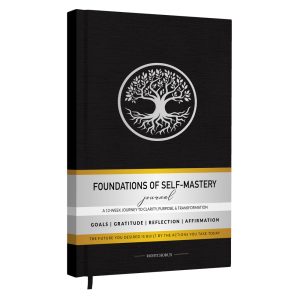A daily reflection journal is more than just a record of your thoughts — it’s a powerful tool for self-discovery, emotional insight, and intentional living.
Whether you’re navigating a major life transition or simply striving to show up more fully each day, incorporating reflection into your daily routine can spark profound personal growth.
In this article, we’ll explore how to build a consistent journaling practice, uncover the mental health benefits of daily self-inquiry, and discover how structured tools like the Foundations of Self-Discovery Mastery Journal make transformation not only possible but deeply sustainable.
Foundations of Self Discovery & Mastery Journal: A 13-Week Personal Development Journal System
$29.95
The Foundations of Self Discovery…
Table of Contents
How to Start a Daily Reflection Journal Practice
Starting a daily reflection journal practice can feel intimidating at first, especially if consistency has eluded you in the past.
The key is building a supportive environment and process that makes the habit feel natural.
By choosing the right timing, setting, and guidance structure, the practice evolves from fleeting inspiration into an empowering daily ritual.
Build a Sustainable Daily Habit
Establishing a daily journaling routine begins with simplicity and intention. The goal isn’t to write pages of thoughts but to show up daily, even if just for a few minutes.
Try these approaches:
- Time-block each day for journaling—early morning or before bed works best for many.
- Pair journaling with a current habit (like your morning coffee or evening tea).
- Create a dedicated space at home, even just a cozy corner with a notebook and pen.
- Start small—aim for 5 to 10 minutes instead of long, overwhelming sessions.
Choosing the right tool can also reinforce your new habit. The Foundations of Self-Discovery Mastery Journal is already structured for sustainability, with daily spreads divided into six actionable prompts and guided inspiration that eliminate decision fatigue.
Beginners find its gentle guidance helps anchor a new rhythm.
Use Structured Prompts for Self-Reflection
If you’ve ever stared at a blank page unsure where to begin, journaling prompts can serve as a bridge to inner clarity.
Prompts offer structure and focus, helping you move past surface-level thoughts into meaningful insight.
In fact, reflective prompts can help you:
- Revisit the emotional tone of your day.
- Recognize recurring thought patterns or behaviors.
- Clarify goals and focus your mental energy.
- Celebrate progress and small wins.
The Foundations of Self-Discovery Mastery Journal features expertly curated prompts on themes like personal values, resilience, self-compassion, and emotional awareness.
These reflections guide you beyond daily events into the why behind your actions—making self-discovery a lived experience, not just a concept.
Foundations of Self Discovery & Mastery Journal: A 13-Week Personal Development Journal System
$29.95
The Foundations of Self Discovery…
Daily Reflection Journal Benefits for Mental Clarity

Journaling consistently not only helps document your journey but also provides scientifically supported mental health benefits.
When we slow down to write, we engage parts of the brain responsible for processing emotion, organizing experience, and making meaning—functions that foster clarity and well-being.
Reduce Mental Clutter and Overthinking
Modern life is mentally noisy—constant stimulation often leaves our minds feeling tangled and overwhelmed.
A daily reflection journal grounds you back in the present moment and gives your brain a space to process.
Benefits include:
- Mental decluttering: Writing thoughts down clears brain fog.
- Fewer ruminating loops: Journaling verbalizes internal stress, reducing overthinking.
- Heightened awareness of triggers: Reflection makes you more conscious of what’s fueling anxiety.
- Improved sleep quality: Journaling before bed can regulate mental chatter and offer closure.
According to research in affective neuroscience, expressive writing lowers emotional reactivity and increases neural integration.
Tools like the Foundations of Self-Discovery Mastery Journal streamline this process with quote-question-affirmation systems and growth-oriented reflections that help users externalize emotions in a safe, intentional way.
Improve Focus and Emotional Intelligence
Beyond reducing stress, journaling consistently sharpens your ability to manage and understand your inner landscape.
Over time, this daily act cultivates emotional intelligence by deepening your awareness of how you think, feel, and respond to life.
Here’s how this plays out:
- You gain clarity on your emotional patterns.
- You start identifying your needs and boundaries.
- You become more empathetic—toward yourself and others.
- You regulate reactions better because you’ve processed them internally first.
The Foundations of Self-Discovery Mastery Journal encourages emotional insight with daily summaries (“Today’s Goal,” “What Went Well,” “What to Improve”) that help you examine emotions, outcomes, and next steps holistically.
The intuitive layout fosters deeper reflection without draining your energy.
Foundations of Self Discovery & Mastery Journal: A 13-Week Personal Development Journal System
$29.95
The Foundations of Self Discovery…
What Makes a Powerful Daily Reflection Journal
Not all journals are created equal. Having the right format can make or break your journaling consistency and breakthrough moments.
A thoughtfully designed journal paves the way to sustainability—and much like a coach, it helps you stay aligned with your purpose while fostering emotional insight.
Elements of an Effective Journal Format
A strong daily reflection journal format should feel grounding and inspiring, not overwhelming.
The ideal journal includes guiding structure while leaving room for spontaneous thoughts.
Here’s what we recommend:
- Consistent daily prompts that provide mental anchors.
- Segments for emotional and result-based tracking (“Today’s Goal,” “Tomorrow’s Next Step”).
- Integration of mindset tools like affirmations and quote-based reflections.
- Ample white space for personal notes and creative expression.
Designed specifically for self-discovery journeys, the Foundations of Self-Discovery Mastery Journal blends these elements masterfully.
Every spread encourages mindfulness through guided reflection, supported by neuroscience-backed layout cues that ensure a flow between logic and emotion.
Tools That Combine Self-Inquiry and Goal Setting
Too often, guided journals focus exclusively on past reflection—or just goal orientation. The true magic happens when you combine both.
This balance helps provide both closure and momentum in your daily life.
A journal should help you:
- Reflect on personal patterns and stories.
- Set meaningful short- and long-term goals.
- Reinforce progress with data-driven check-ins.
- Stay emotionally engaged through empowering rituals.
The dynamic layout of the Foundations of Self-Discovery Mastery Journal supports this equilibrium across 13 curated weeks.
With dedicated sections like “Foundations of Self-Mastery” and “Next 13-Week Planning,” it helps journalers track both inner growth and outer action in tandem.
Foundations of Self Discovery & Mastery Journal: A 13-Week Personal Development Journal System
$29.95
The Foundations of Self Discovery…
Finding Self-Compassion Through Your Daily Reflection Journal

Self-discovery can sometimes reveal hard truths—but it also reveals your inner strength.
When used mindfully, a daily reflection journal becomes a nurturing space where you make peace with your mistakes, celebrate your growth, and learn to speak kindly to yourself.
Explore Inner Dialogue in a Judgment-Free Way
Your journal is often the first place you reveal your true feelings.
It becomes a mirror for your internal world—and the more you use it, the more honest and compassionate your reflections become.
Using your journal, you can:
- Observe how your mind relates to perceived failures.
- Discover the tone of your inner dialogue.
- Practice grace and forgiveness intentionally.
- Give voice to parts of yourself that feel unheard.
Tools like the Foundations of Self-Discovery Mastery Journal are built for these moments.
Its gentle language, model journal entries, and affirmation-based structure help you cultivate a constructive relationship with yourself—turning judgment into curiosity.
Reframe Negative Thinking
One of the most transformative acts of journaling is learning how to reframe limiting thoughts.
Instead of spiraling into self-doubt or harsh narratives, you can plant new beliefs grounded in hope, truth, and strength.
Journaling builds these skills by enabling you to:
- Identify recurring negative beliefs (“I’m not good enough”).
- Explore the origin of those feelings without shame.
- Counter them with data from your life (“I made progress today”).
- Replace them with kinder, more accurate scripts.
The Foundations of Self-Discovery Mastery Journal encourages daily reframing through its layout and weekly check-ins, helping you track your mindset shifts and anchor new empowering narratives.
Foundations of Self Discovery & Mastery Journal: A 13-Week Personal Development Journal System
$29.95
The Foundations of Self Discovery…
Reflective Routines That Stick (And Feel Meaningful)
If you want any habit to last, it must become emotionally meaningful. Daily reflection turns from a task to a beloved ritual when you view it as an act of care.
Bring beauty into your journaling environment, and you’ll activate all your senses—leading to stronger behavioral anchoring and emotional reward.
Create Rituals, Not Just Routines
Ritualizing your reflection practice makes it sticky. It adds a layer of reverence and comfort that transforms it into something sacred and healing.
Consider these suggestions:
- Light a candle or use aromatherapy before writing.
- Choose grounding soundscapes like gentle music or nature sounds.
- Journal outdoors or near soft light to deepen presence.
- Set an opening or closing affirmation to bookmark the practice.
The Foundations of Self-Discovery Mastery Journal complements these rituals with visual elegance and tactile quality. Many users say it feels like a luxury experience—one that honors their inner growth properly.
Anchor New Beliefs Through Repetition
What we repeat, we believe. That’s what makes journaling so powerful: it turns ideas into identity.
Daily writing helps crystallize new mental models, allowing them to stick every time you return to the page.
Anchor insight into transformation by:
- Repeating affirmations that align with your values.
- Revisiting takeaways from challenging days.
- Noting progress patterns in “What Went Well” sections.
- Setting small, achievable next steps to reinforce your sense of agency.
The Foundations of Self-Discovery Mastery Journal supports this transformation by encouraging repetition and integration—not only across daily pages but through 13 weeks of sequenced reflection, affirmation, and milestone celebration.
Foundations of Self Discovery & Mastery Journal: A 13-Week Personal Development Journal System
$29.95
The Foundations of Self Discovery…
Celebrating Your Self-Discovery Wins

Daily journaling grows more rewarding the longer you stay committed.
And while it begins with inner work, it naturally leads to transformation in how you approach people, purpose, productivity, and peace.
Recognizing those shifts can motivate deeper commitment.
Honor Your Growth Milestones
When you pause to celebrate how far you’ve come, journaling becomes a joy—not a chore. Let’s make space for that.
Try this:
- Create “highlight reels” of your favorite insights.
- Use stickers, visuals, or color to decorate achievements.
- Write letters to your “younger self.”
- Revisit your first entries every 13 weeks.
Pages like “Progress Reflection,” “Letter to Future Self,” and the “Gratitude Vision Board” inside the Foundations of Self-Discovery Mastery Journal make celebration part of the process.
Share Your Journey with Others
Self-reflection can feel isolating—but when shared, it becomes community. Inspire others by being open about your process.
How to share:
- Talk about your journaling rituals with close friends.
- Join online communities focused on personal growth.
- Post photos of your journal entries or inspirational takeaways.
- Recommend tools like the Foundations of Self-Discovery Mastery Journal to support others in their journey.
Conclusion
Using a daily reflection journal isn’t just about improving your day. It’s about becoming who you were meant to be—intentional, balanced, and aligned with your deeper truths.
Journaling is your mirror, your map, and your momentum rolled into one.
If you’re ready to deepen your self-discovery journey and build long-term emotional clarity, look no further than the Foundations of Self-Discovery Mastery Journal.
It’s one of the most comprehensive and affirming journals out there—helping you show up for your life with courage and clarity.
Start writing. The person you’re becoming is waiting.
Frequently Asked Questions
A daily reflection journal is a structured space where you regularly record thoughts, feelings, intentions, and observations. It helps develop self-awareness, reduce reactive behavior, and track emotional and behavioral patterns in a safe container for mental clarity and personal growth.
Most people benefit from guided layouts including prompts such as gratitude entries, affirmations, challenges, and daily goals. The Foundations of Self-Discovery Mastery Journal offers a beautifully clear layout with six core daily prompts plus inspirational reflections.
Even on uneventful days, use your journal to check in with your emotional state, your energy level, something you’re grateful for, or what you’re currently learning about yourself. Guided tools like the Foundations of Self-Discovery Mastery Journal include thoughtful prompts that make it easy to write meaningfully, even on quieter days.
Absolutely. Progress in journaling is cumulative, not perfect. Life happens, and it’s important to offer yourself grace. The Foundations of Self-Discovery Mastery Journal supports returns to the practice with pages that make it easy to reflect and begin again.
Journaling develops emotional intelligence by helping you identify, label, and reflect on emotions. Every daily entry offers a chance to explore emotional reactions and unconscious patterns, strengthening empathy and decision-making.
Freeform journaling is open-ended, allowing thoughts to flow without structure. Guided journaling uses prompts to explore specific areas. The Foundations of Self-Discovery Mastery Journal combines both: a structured framework with open space for personalized insight.
Yes. Neuroscience research shows that expressive writing can reduce the intensity of anxious thoughts, improve emotional regulation, and build a sense of control. A structured journal like the Foundations of Self-Discovery Mastery Journal makes this consistent and accessible.
Reflection doesn’t require hours of writing. Even 5 to 10 minutes daily can foster clarity and progress. The Foundations of Self-Discovery Mastery Journal is designed for this rhythm, providing rich yet brief prompts.
Yes—the Foundations of Self-Discovery Mastery Journal is one of the best tools for beginners. It includes prompts, example entries, and structured layouts designed to remove overwhelm and build consistency.
With time, you’ll notice improved emotional resilience, stronger sense of self, better decision-making, greater creativity, and a more intentional relationship with your life. A well-designed tool like the Foundations of Self-Discovery Mastery Journal helps make those benefits last.







